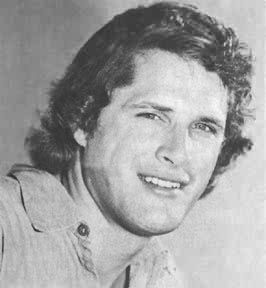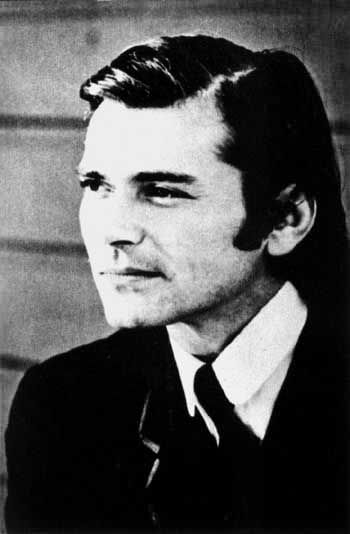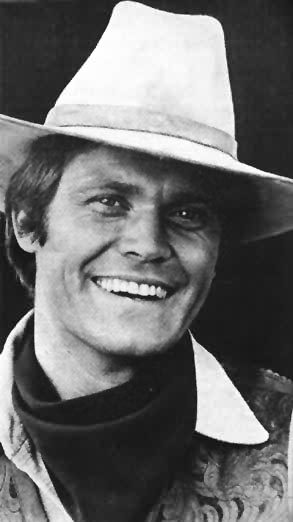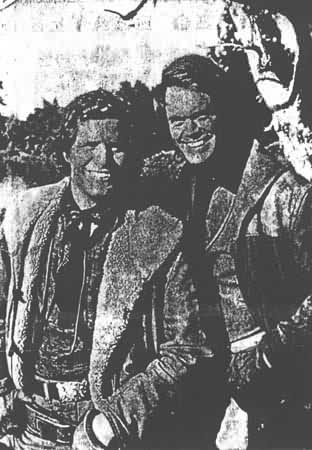- NEXT WEEK ROGER
DAVIS WILL APPEAR ON THE SMALL SCREEN,
THE THIRD MUSKETEER IN SEARCH OF AN AMNESTY
- unknown Spanish magazine, 1972
 It is to be supposed that it is only a matter
time, before they say of Roger Davis that he is in the same mold
as a Robert Wagner, or - why not? - another George Peppard.
All that, although it sounds unimportant, is in fact vital -
very important. The acting profession is one of the most difficult,
in which a young man can demonstrate his worth both in front
of the producers and the audience, who constantly seek to raise
up a new screen legend. No-one felt sadder than Ben Murphy at
being left to go solo on the show. But life goes on and with
it the obligations of the production schedule.
It is to be supposed that it is only a matter
time, before they say of Roger Davis that he is in the same mold
as a Robert Wagner, or - why not? - another George Peppard.
All that, although it sounds unimportant, is in fact vital -
very important. The acting profession is one of the most difficult,
in which a young man can demonstrate his worth both in front
of the producers and the audience, who constantly seek to raise
up a new screen legend. No-one felt sadder than Ben Murphy at
being left to go solo on the show. But life goes on and with
it the obligations of the production schedule.
The first appearance of the third musketeer,
Roger Davis, who replaces the ill-fated Pete Duel, in the newer
episodes is imminent, planned for Sunday 29th in its usual
"Afternoon Entertainment for Everyone" slot. Pete Duel
died in Hollywood last new Year in circumstances which are still
not very clear and rather confusing. (Suicide? Murder?) These
circumstances, which have so many followers, resulted in the popular
series hitting the news headlines.
When Roy Hill, director of the more than
serviceable film, "Butch Cassidy and the Sundance Kid"
planned to show violent and unjust repression of the social world
using two marginalised human beings, he weighed up the risks to
be taken in an intelligent fashion. The most important things
was that the two robbers should strike the spectator as likeable.
Choosing two handsome young men was already one way of winning
over the female audience; the cleverness of the script and characterisation
would do the rest.
In creating 'Alias Smith and Jones',
Roy Huggins has achieved something similar. Any production which
seeks commercial growth responds to market research and offers
a product for which there is a demand.
Television series have to respond still
more markedly to this obligation, for they are based on a typology
and on certain key personalities rather than on the development
of a storyline, since success depends on the fact that the people
- and what they represent - appeal to the mass of spectators,
rather than on particular interest generated by any one of the
episodes. This general phenomenon has hardly any exception, except
perhaps for the case of 'Mission Impossible'.
On TV the western storyline
has always been interpreted as a struggle by one individual,
never as a collective struggle, and in this respect 'Alias
Smith and Jones' is no exception. The plot is
little more than a re-working of the 'generous bandit' theme,
with the protagonists in search of an amnesty in this case. It's
very probable that this approach will be a very popular one in
North American mythology, as the original title shows: "Alias
Smith and Jones", converted in this country to "The
Two Musketeers" to adapt it approximately to the European
mythology, in the same way that they would have changed a series
on 'Jose Maria' "El Tempranillo" to something such as
"The Robin Hood of the Sierra Morena."
Where an appreciably large difference
in the treatment of the plot is felt, is in the resources and
reasons used by these two men for seeking their re-integration
into society. This approach, which could melodramatically
take advantage of the sympathy, which is the average man feels
for their search for redemption and the desire to live in peace,
changes our feelings when it explains in the first episode that
leaving their former lifestyle is in no way a repentance, rather
it is a response to the reinforcement of train security and improved
bank protection.
Their search for amnesty is merely used
as an introduction and explanation for why they get into trouble;
they rarely repeat their desire for a pardon, and on the
odd occasion when they do, it is only to escape from the mess
they have got into in that particular episode. To escape from
trouble they use their superior ability with guns only as a last
resort. 
The theme of the likeable robber is continually
reworked by the cinema industry and, of course, television can
do no less. The conventions of the small screen simply have
to be followed, for many and varied reasons that it is not
the appropriate time to repeat here. Smith and Jones will continue
to seek for an amnesty and their bodies will not be shot to pieces
by government troops. Until they are successful, the concise scripts,
brought to life by a group of fifth- or sixth-rate directors (with
the exception of, for example, Barry Shear, who continues to have
a sad success on the fringes of television with "The President")
will show us the escapades and adventures of those two 'expert
bank and train robbers'.
The humour in this series is a vital ingredient,
just as it was in "The chick on the television"
and "Two idiots in a tight spot". As Robert Altman (also
trained in small screen productions) declared so eloquently, saying
things in an elegant fashion can give so much more meaning! For
this reason, the violence in the direction will be conscientiously
reduced and camouflaged, following the example set by the script.
In each case, no-one could say that it is the work of a refined
group of directors, rather it is the work of a group of practical
and efficient directors, despite the occasional error, like that
of Vincent Sherman [CJC's Note:
Vincent Sherman directed "Miracle
at Santa Marta", which originally aired in the US on 12/30/71], in directing the episode broadcast on 24th
September in Spain. Sherman practically destroyed the plot with
an absurd game of camera work and vulgar and childish montage.
It was clearly noticeable that his work is dated and
he is out of touch with almost everything. For to be in the director's
seat, it is not enough to show the equivalent of an equity card
- an historical portfolio. As an example, we could have reviewed
recently in Spain one of his most famous works, "The City
before me." We will make no further comment.
The directorial work with the actors in
the series is daringly brilliant and no cause for regret. The
themes do not demand great creations on the personal level and
everything works out well, due to an easy formula, which oscillates
half way between reliance on overacting and compliance with experience.
Because moreover, there is the risk of 'failure', run by any series,
which doesn't count a star, universally known for his work on
the big screen among it's cast, this cast is drawn basically from
the ever-present unknowns and second-strings, who form the most
restrained and numerous sector in any company of young actors,
whether we wish to recognise the fact of not. Duel and Murphy
belong to this group.(1) Without doubt, this quality derives
from an apprenticeship in the many schools of acting, which
flourish in those countries, where the acting profession
is held to be important; Spain, sadly, does not figure among them.
The proof of this statement is clear: What results would
you get, if you gave any of these scripts and also any director
to Spanish actors?
Quite definitely, "Alias Smith and
Jones" is not only to be recommended as a pleasant way of
 passing Sunday afternoon, as some
people suggest, but also as necessary viewing for many Spanish
scriptwriters and directors, so that they can learn develop the
skill of manipulating a script; a skill which is more complicated
than it seems.
passing Sunday afternoon, as some
people suggest, but also as necessary viewing for many Spanish
scriptwriters and directors, so that they can learn develop the
skill of manipulating a script; a skill which is more complicated
than it seems.
(1) In Spain, we were first able to see
Pete in the confusing film "Canons for Cordoba" by the
equally confused Wendkos. We saw Murphy in no less a film than
"The Graduate" by Nichols.
Back
to Articles List
 It is to be supposed that it is only a matter
time, before they say of Roger Davis that he is in the same mold
as a Robert Wagner, or - why not? - another George Peppard.
All that, although it sounds unimportant, is in fact vital -
very important. The acting profession is one of the most difficult,
in which a young man can demonstrate his worth both in front
of the producers and the audience, who constantly seek to raise
up a new screen legend. No-one felt sadder than Ben Murphy at
being left to go solo on the show. But life goes on and with
it the obligations of the production schedule.
It is to be supposed that it is only a matter
time, before they say of Roger Davis that he is in the same mold
as a Robert Wagner, or - why not? - another George Peppard.
All that, although it sounds unimportant, is in fact vital -
very important. The acting profession is one of the most difficult,
in which a young man can demonstrate his worth both in front
of the producers and the audience, who constantly seek to raise
up a new screen legend. No-one felt sadder than Ben Murphy at
being left to go solo on the show. But life goes on and with
it the obligations of the production schedule.


 passing Sunday afternoon, as some
people suggest, but also as necessary viewing for many Spanish
scriptwriters and directors, so that they can learn develop the
skill of manipulating a script; a skill which is more complicated
than it seems.
passing Sunday afternoon, as some
people suggest, but also as necessary viewing for many Spanish
scriptwriters and directors, so that they can learn develop the
skill of manipulating a script; a skill which is more complicated
than it seems.